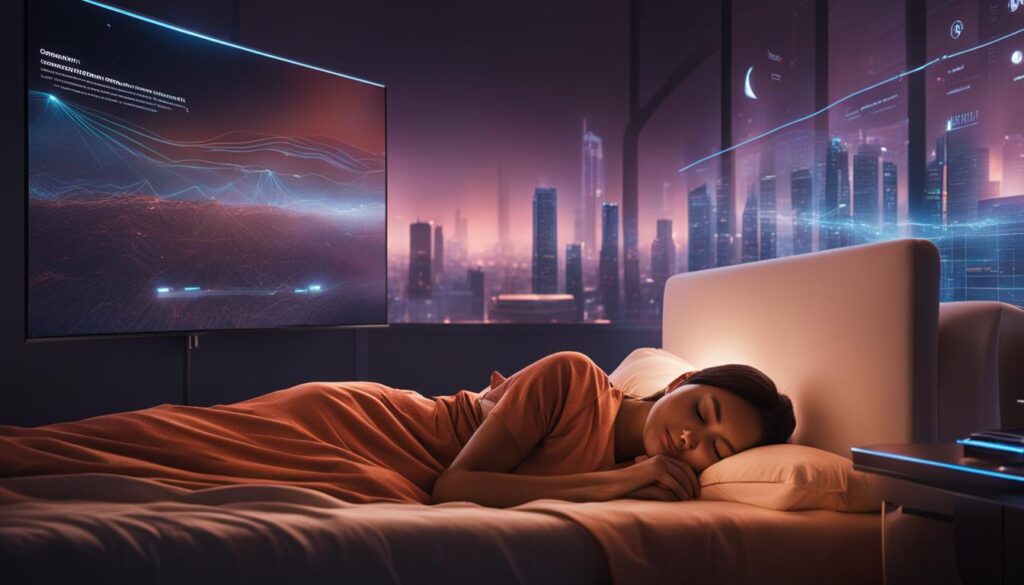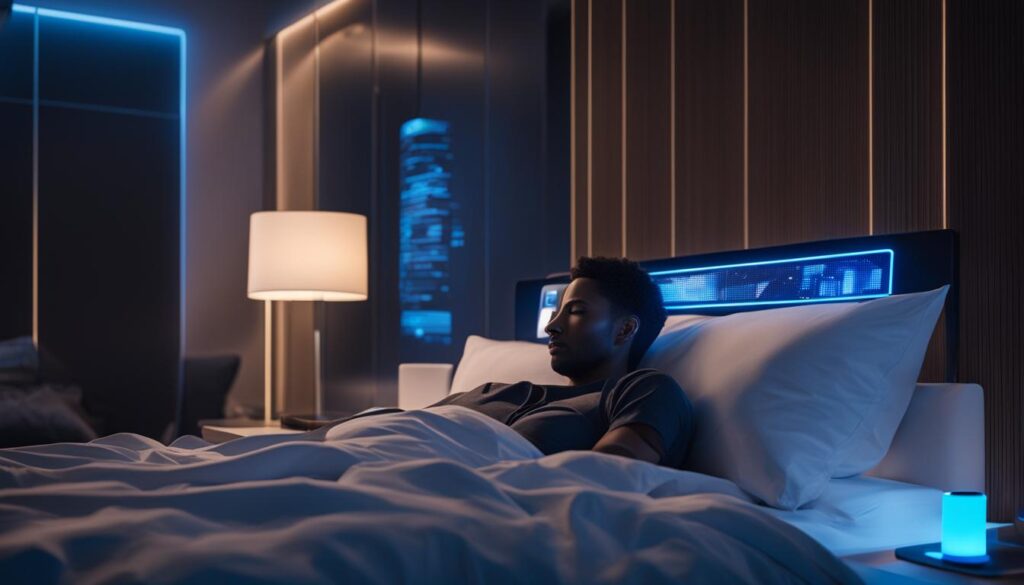Artificial Intelligence (AI) has revolutionized the way we approach sleep, offering advanced solutions for enhanced rest and recovery. Utilizing AI-enhanced sleep technology, such as AI-powered sleep tracking devices and artificial intelligence sleep solutions, individuals can optimize their sleep patterns and improve overall well-being.
AI algorithms analyze raw sensor signals from devices like Fitbit and Pixel Watch, providing detailed information about sleep stages, movement patterns, and stress levels. These algorithms map data from heart rate and movement sensors to estimate sleep stages and duration. Additionally, AI can detect coughs and snores during sleep, allowing for smart wake algorithms that wake users during the lightest sleep stage.
With continuous advancements in AI technology, sleep optimization is constantly evolving. The potential for AI-enhanced sleep solutions to significantly improve sleep quality and overall wellness is immense.
How AI Enhances Sleep Tracking and Analysis
AI technology has revolutionized the way we track and analyze sleep patterns, leading to significant advancements in sleep optimization. By combining data from various sensors, AI-powered sleep tracking algorithms provide detailed insights into sleep stages and duration. Fitbit’s sleep-tracking algorithm, for example, analyzes movement and heartbeat intervals to estimate sleep stages and duration with high accuracy.
But AI goes beyond basic sleep tracking. It can detect coughs and snores during sleep, allowing users to address potential sleep disturbances and improve overall sleep quality. Furthermore, AI algorithms determine the optimal time to wake users by analyzing sleep patterns and waking them during the lightest sleep stage, promoting a more refreshed and energized morning.
The integration of AI with smart bed technology has also enhanced sleep analysis. Smart beds equipped with AI-powered sensors monitor sleep quality and make adjustments to optimize comfort and support. These advanced sleep devices provide personalized sleep data and valuable recommendations for improving sleep patterns, helping individuals achieve better rest and recovery.
AI-Enhanced Sleep Tracking Features:
- Accurate estimation of sleep stages and duration
- Detection of coughs and snores during sleep
- Smart wake algorithms for optimal morning awakening
- Integration with smart bed technology for personalized comfort
- Insights and recommendations for better sleep patterns
AI-powered sleep devices, integrated with advanced algorithms, provide personalized sleep data and valuable recommendations for improving sleep patterns.
With AI’s continuous advancements, sleep tracking and analysis have become more accurate and personalized. By harnessing the power of AI, individuals can gain a deeper understanding of their sleep patterns and make informed decisions to improve their overall sleep quality and well-being.
Sleep Apps that use AI:
Sleep.ai: This app uses AI to analyze your sleep data and provide you with personalized sleep insights and recommendations. It also uses AI to generate custom sleep sounds and music to help you fall asleep and stay asleep.
Sleeptracker: This app uses AI to analyze your sleep data and provide you with a sleep score based on your sleep quality. It also uses AI to identify potential sleep disturbances and provide you with personalized recommendations to improve your sleep.
Relax Melodies: Relax Melodies is a sleep aid app that uses AI to generate personalized relaxation sounds and music to help you fall asleep and stay asleep. The app uses feedback from users to learn their preferences and improve its AI algorithms over time.
AI and Sleep Medicine: Advancing Diagnosis and Treatment
AI has opened up new possibilities in the field of sleep medicine, offering innovative solutions for diagnosing and treating sleep disorders. One area where AI has made significant advancements is in personalized sleep coaching. By leveraging the power of AI algorithms, individuals can now receive tailored recommendations to improve their sleep quality and overall well-being.
Through the analysis of large datasets, AI can identify patterns and trends that aid in the diagnosis of sleep disorders. One such example is the detection of sleep apnea markers. AI algorithms can analyze sleep testing data to identify specific indicators of sleep apnea, allowing healthcare professionals to make accurate diagnoses and develop targeted treatment plans.
Furthermore, AI-driven sleep improvement tools have become invaluable in optimizing sleep health. These tools utilize user data to provide personalized guidance on sleep hygiene, relaxation techniques, and environmental adjustments. By leveraging AI’s ability to process vast amounts of information, sleep improvement tools can offer tailored suggestions that align with each individual’s unique needs and preferences.
The Future of AI in Sleep Medicine
AI-powered sleep medicine holds immense potential in delivering personalized treatment plans and improving patient outcomes.
Looking ahead, the future of AI in sleep medicine holds immense potential. One exciting prospect is the optimization of circadian rhythms. By analyzing sleep patterns and other relevant data, AI algorithms can recommend personalized sleep schedules that align with an individual’s natural circadian rhythm. This has the potential to not only improve sleep quality but also enhance overall health and well-being.
While AI brings forth exciting advancements in sleep medicine, it is important to address certain challenges. Data privacy and security are critical concerns when it comes to AI-enabled sleep solutions. Users must be aware of the risks associated with sharing personal sleep data and need to ensure that appropriate measures are in place to protect their information.
Additionally, ethical considerations surrounding AI in sleep medicine must be carefully examined. As AI becomes increasingly integrated into healthcare practices, it is essential to navigate the balance between the benefits and potential concerns associated with relying on AI-driven decisions and interventions.

The Potential of AI in Sleep Medicine
AI-driven sleep medicine has the potential to revolutionize the way we approach sleep disorders, offering personalized solutions that improve patient outcomes.
In conclusion, AI is playing a pivotal role in advancing sleep medicine. By leveraging AI algorithms, personalized sleep coaching and sleep improvement tools provide tailored recommendations to optimize sleep quality. The future holds great promise for AI in sleep medicine, with opportunities to optimize circadian rhythms and enhance overall patient care. However, it is crucial to address concerns related to data privacy, security, and ethical considerations to ensure the responsible and effective application of AI in sleep medicine.
The Future of AI in Sleep: Opportunities and Challenges
As AI technology continues to advance, the future of AI in sleep holds immense potential to optimize sleep and wellness. One of the exciting opportunities lies in circadian rhythm optimization. By analyzing an individual’s sleep patterns, AI algorithms can recommend personalized sleep schedules that align with their natural body rhythms. This can help regulate sleep-wake cycles and promote better sleep quality.
Another area where AI is making significant strides is in the development of advanced sleep tracking devices. These devices, integrated with AI algorithms, provide real-time monitoring of sleep patterns and offer valuable insights into sleep quality and patterns. Users can track their sleep stages, heart rate, and movement, gaining a deeper understanding of their sleep habits. This information can be used to make informed decisions to improve sleep quality.
While the future of AI in sleep presents exciting opportunities, it also comes with its share of challenges. Data privacy and security concerns are paramount when it comes to using AI sleep monitoring devices and apps. Users must be aware of the potential risks associated with sharing their personal sleep data and take necessary precautions to protect their privacy. Additionally, ethical considerations need to be addressed to ensure a balance between the benefits of AI in sleep and any potential concerns.
Key Points:
- AI algorithms can optimize circadian rhythms for better sleep by analyzing sleep patterns.
- AI-powered sleep tracking devices provide real-time monitoring and insights into sleep quality.
- Data privacy and security concerns must be addressed in the use of AI sleep monitoring.
- Ethical considerations are crucial to maintaining a balance between the benefits and concerns of AI in sleep.

Conclusion
AI solutions for sleep have revolutionized the way we approach sleep, offering advanced sleep technology to enhance our rest and overall well-being. By leveraging AI-powered sleep tracking devices and sleep improvement applications, you can gain valuable insights into your sleep patterns and make informed decisions to improve your sleep quality.
The field of sleep medicine has also been significantly advanced by AI, providing personalized treatment plans and driving precision medicine for sleep disorders. With the help of AI algorithms, diagnosis and treatment options are improving, allowing for better patient outcomes.
Looking ahead, the future of AI in sleep holds immense potential. Advancements in AI technology can optimize circadian rhythms, recommend personalized sleep schedules, and offer real-time sleep monitoring. However, it is important to address concerns related to data privacy, security, and ethical considerations as AI becomes more ingrained in our personal wellness.
With continued advancements in AI technology, we can expect to see even more innovative and effective sleep solutions, leading to better sleep and improved health outcomes for individuals worldwide.
